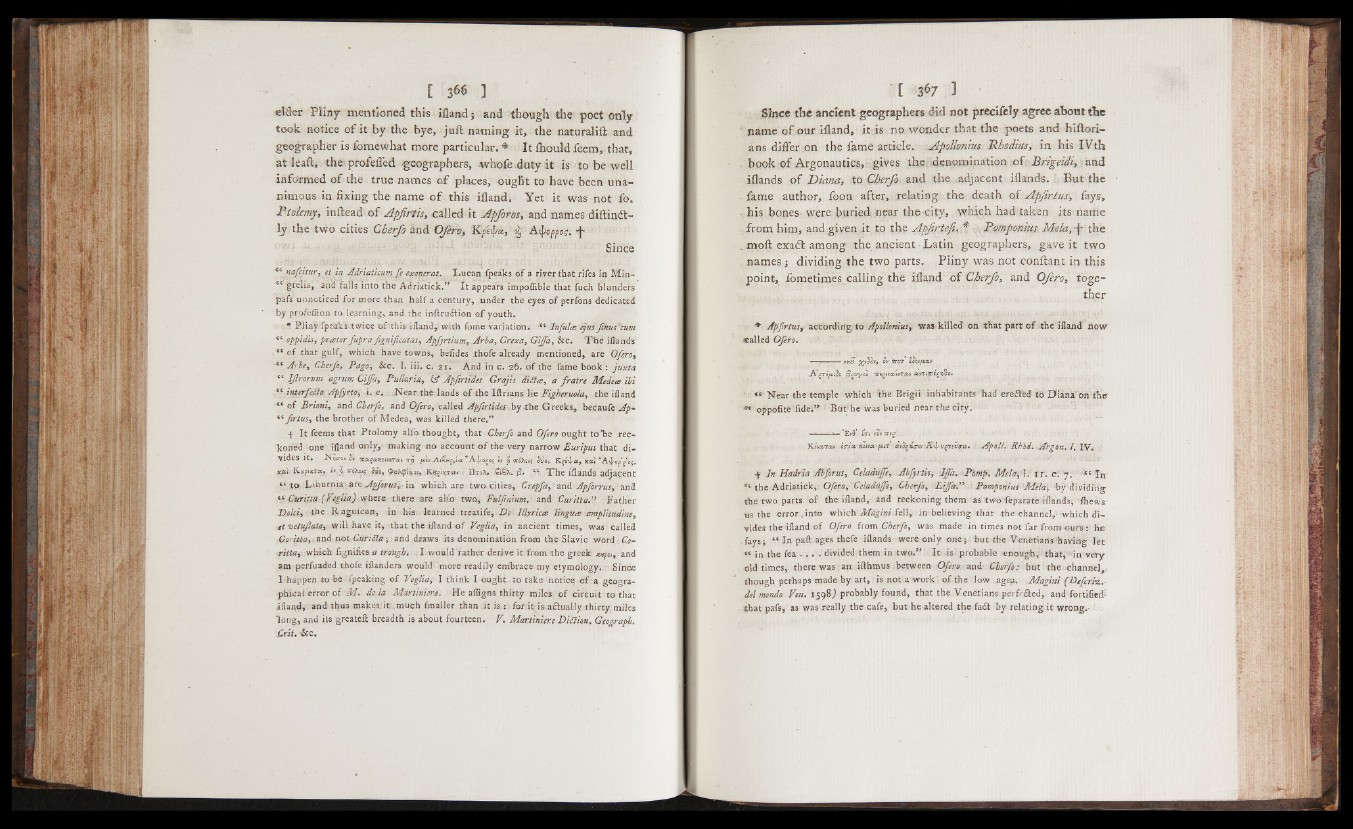
elder Pliny mentioned this i ifland ; and though the poet only
took notice o f it by the bye, ju it naming it, the naturalifi: and
geographer is fomewhat more particular. * It ihould feem, that,
at Jeaft, the profeffed geographers, whofe duty it is to be well
informed o f the true names o f places, ought to have been unanimous
in fixing the name o f this ifland. Yet it was not fo.
Ptolemy, initead o f Apfirtis, called it Apforos, and names diftinét-
ly the two cities Cherfo ànd Oféro, Kpst]/«, f Aipoppoç. '
Since
i t in Adriaticum fe exonerat. Lucan fpealcs of a river that rifes in Min-
<c greüa, and falls into the Adriàtick.” It appears impoffible that fuch blunders
pais unnoticed for more than half a century, under the eyes of peribns dedicated
by profeffion to learning, and the inftru&ion of youth.
* Pliny fpeaks.twice o f this ifland, with fome variation. Xi Infula ejus fmus%cum
oppidis, pr-esterfuprafignificatas, Apfyrtium, Arba, Crexa, Gijfa, &c. T h é iflands
. <s of that gulf, which have towns, befides ihofe already mentioned, are Ofero,
*6 Arbe, Cherfo, Pago, &c. 1. iii. c. 21. And in c. 26. of the fame book : juxta
“ IJirorum agrumCjjfa, Pullaria., & Apfrtides Grajis di£ia, a fratre Medea ibi
*e interfe&oApfyrto, i. e. .Near the lands of the Iftrians lie Figheruola, the ifland
“ of Brionu, and Cherfo y and Ofero, called Apfirtides by the Greeks, becaufe^f/»-
“ Jirtus, the brother of Medea, was killed there.”
f It féems that Ptolomy alio thought, that Cherfo and Ofero ought to*be reckoned
one ifland only, making no account o f the very narrow Euripus that divides
It. Nïc-w bè Ka.ça.xnvera.1 rjj {¿Iv.A&xgy'ux. * A^oços h y, îtoXeî? bvo, K xcù "AvJ/opYoç.
xar.-K.ypi*r») et.Trohepç bvo, K.&oix.Tot* iïtoa* Ç*Ca. /?• Th e iflands adjacent
“ .to Liburnia< arç Affords, in which are two cities, Grepfa, i and Apforrus, and
Guritta (Veglia) where there are alfo two, Fulfinium, and Curittad* Father
Dolei.i the Ragufcan, in his learned treatife, De Illyrica lingua amplitudine,
et vetujiate, will have it, that the ifland of Veglia, in ancient times, was called
Goritta, and not Curifi# ; and draws its denomination From the. Slavic word Co-
ritta, which fignifies a trough, I would rather derive it from the greek *ypo», and
am perfuaded thofe iflanders would more readily embrace my etymology. SinGe
I happen to be fpeaking of Yeglia, I think I ought to take notice of a geographical
error o£M . de la Martiniere. He afligns thirty miles; of circuit to that
ifland, and thus makes, it.much fmaller than it is, for it is actually thirty, miles
lon g, and its greateft breadth is about fourteen. V . Martini eu Di£iion. Geograph.
Cut. -&c.
Since the ancient geographers did not precifely agree about the
name o f our ifland, it is no wonder that the poets and hiftori-
ans differ on the fame article. Apollonius Rhodius, in his IVth
book of Argonautics,: gives the denomination o f Brigeidi, and
iflands o f Diana, to Cherfo, and the .adjacent iflands. But the
fame author, foon after, relating the death o f Apfirtus, fays,
his bones were buried near the city, which had taken its name
from him, and given it to the Apfrtefi. * Pomponius Mela, j~ the
mofl exadt among the ancient Latin geographers, gave it two
names ; dividing the two parts. Piiny was not conftant in this
point, fometimes calling the ifland o f Cherfo, and Ofero, together
* Apfirtus, according to Apollonius, was killed on that part o f the ifland now
«ailed Ofero.
— —- -■ ■ ■ »jjs %sbot) ov w o t ebeipeaif
Pegr¿[¿ibi figvy oi ire^totieTUi avrmegtiSe.
“ Near the temple which the Brigii inhabitants had ere&ed td Diana on the
M oppofite fide.” But he was buried near the city.
■ ■ i - >Ev0 eti'vw ireg
K i t a r « » orl<* xewa.-fd.eT avbgei&iv’K-^vgrevlnv. u4-poll. E h i d . A r g o n . I . I V .
In Hadria Abforus, Celaduffe, Abfyrtis, Ijja. Pbmp. Mela-^ I . 1 1 , c: 7. “ Tn
rt the Adriatick, Ofero, Celadufft, Gberfo, Lijai.” Pomponius Mtla\ by dividing
the two parts of the ifland, and reckoning them as two'feparate iifandSi' Ihews
us the error,into which Magini fe ll, in-believing that the channel,- which divides
the ifland of Ofero from Cherfo, was made in times not far from ou rs: he
fays; “ In paft ages thefe iflands were only one;, but the Venetiansifiavirtg let
« ¡n the fea . . . . divided them in two.” 1 It is ' probable enough, that,- in very
old times, there was an iftbmus between Ofero and Cherfir but the channel,,
though perhaps made by art, is not a work of the low ag^s. JHagini fDefcrr.z.-
del mondo Fen. 1598) probably found, that the Venetians perfected, and fortified'
ihat pais, as was really the cafe, but he altered the fa il by relating it wrong,-